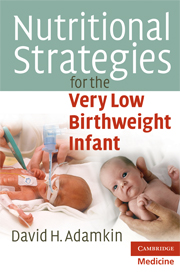Book contents
- Frontmatter
- Contents
- Acknowledgement
- Foreword
- Glossary
- 1 Introduction
- 2 Fluid and electrolyte management (Na, Cl and K)
- 3 Energy
- 4 Intravenous carbohydrates
- 5 Intravenous lipids
- 6 Early total parenteral nutrition (TPN)
- 7 Parenteral calcium, phosphorus, magnesium, and vitamin D
- 8 Parenteral vitamins
- 9 Trace elements and iron
- 10 Parenteral nutrition guide
- 11 Parenteral nutrition-associated cholestasis in VLBW infants
- 12 Enteral nutrition
- 13 Enteral feeding guidelines practicum
- 14 Optimizing enteral nutrition: protein
- 15 Human milk
- 16 Premature infant formulas
- 17 Standard infant formulas
- 18 Soya formulas
- 19 Protein hydrolysate formulas
- 20 Enteral calcium, phosphorus, magnesium, and vitamin D
- 21 Iron
- 22 Hypercaloric feeding strategy
- 23 Growth in the neonatal intensive care unit influences neurodevelopmental and growth outcomes
- 24 Nutritional assessment
- 25 Post-discharge strategies
- 26 Nutritional management of preterm infants with short bowel syndrome
- 27 Summary
- Index
12 - Enteral nutrition
Published online by Cambridge University Press: 05 August 2012
- Frontmatter
- Contents
- Acknowledgement
- Foreword
- Glossary
- 1 Introduction
- 2 Fluid and electrolyte management (Na, Cl and K)
- 3 Energy
- 4 Intravenous carbohydrates
- 5 Intravenous lipids
- 6 Early total parenteral nutrition (TPN)
- 7 Parenteral calcium, phosphorus, magnesium, and vitamin D
- 8 Parenteral vitamins
- 9 Trace elements and iron
- 10 Parenteral nutrition guide
- 11 Parenteral nutrition-associated cholestasis in VLBW infants
- 12 Enteral nutrition
- 13 Enteral feeding guidelines practicum
- 14 Optimizing enteral nutrition: protein
- 15 Human milk
- 16 Premature infant formulas
- 17 Standard infant formulas
- 18 Soya formulas
- 19 Protein hydrolysate formulas
- 20 Enteral calcium, phosphorus, magnesium, and vitamin D
- 21 Iron
- 22 Hypercaloric feeding strategy
- 23 Growth in the neonatal intensive care unit influences neurodevelopmental and growth outcomes
- 24 Nutritional assessment
- 25 Post-discharge strategies
- 26 Nutritional management of preterm infants with short bowel syndrome
- 27 Summary
- Index
Summary
“NECiphobia” (the fear of NEC) is the most prevalent reason clinicians withhold enteral feedings in VLBW infants. NEC most frequently occurs in VLBW infants who have received enteral nutrition. When parenteral nutrition is used exclusively for the provision of nutrients, the absence of enteral feedings is associated with morphologic and functional changes in the gut with a significant decrease in intestinal mass, a decrease in mucosal enzyme activity, and an increase in gut permeability. The changes are due primarily to the lack of luminal nutrients rather than the TPN. Therefore, parenteral nutrition does little to support the function of the gastrointestinal tract. The timing of the initial feedings for the preterm infant remains controversial. As pediatric TPN solutions designed for neonates became available, many clinicians chose to use parenteral nutrition exclusively in the sick, ventilated, preterm infant because of concerns about necrotizing enterocolitis. Total parenteral nutrition was thought to be a logical continuation of the transplacental nutrition the infants received in utero. However, this view discounts any role that swallowed amniotic fluid may play in nutrition and in the development of the gastrointestinal tract. In fact, by the end of the third trimester, the amniotic fluid provides the fetus with the same enteral volume intake and approximately 25% of the enteral protein intake as that of a term, breastfed infant. Studies in animals maintained in an anabolic state with TPN, but deprived of enteral substrate, confirmed that intraluminal nutrition was necessary for the development of normal gastrointestinal structure and functional integrity. Enteral feedings have both direct trophic effects and indirect effects secondary to the release of intestinal hormones.
- Type
- Chapter
- Information
- Publisher: Cambridge University PressPrint publication year: 2009



